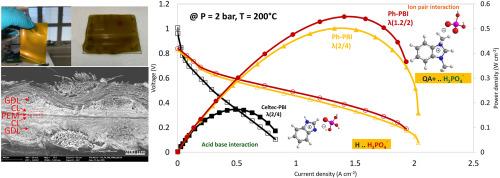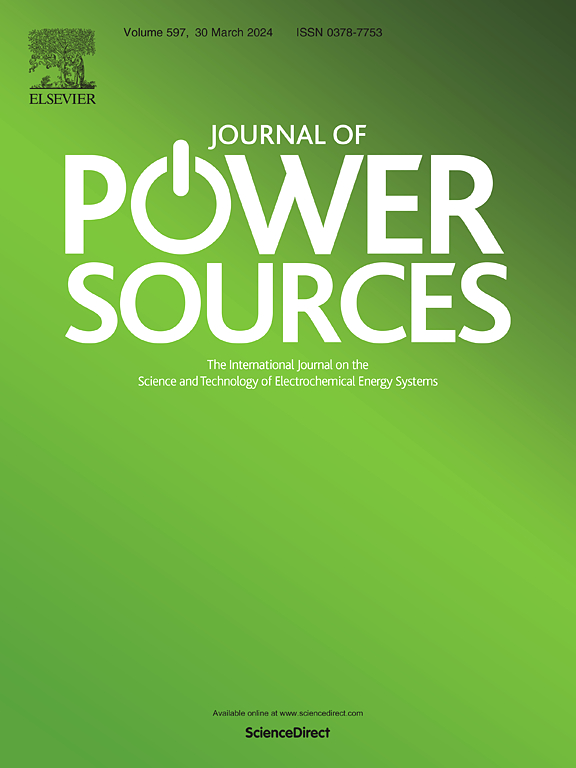Quaternized polybenzimidazole ion-pair blend membranes for high performance and stability in high-temperature proton exchange membrane fuel cells
IF 7.9
2区 工程技术
Q1 CHEMISTRY, PHYSICAL
引用次数: 0
Abstract
High-temperature proton exchange membrane fuel cells (HT-PEMFCs) require effective and selective proton-transporting membranes, which should additionally be affordably accessible. Quaternized polybenzimidazole may enable such proton transport if it can be functionally introduced into an adequate membrane conformation. Here, we post-modified polybenzimidazole (PBI) via N-alkylation/arylation, creating a positively charged polymer backbone that improves solubility and processability in organic solvents. The thermal stability of the N-phenyl-substituted OPBI (Ph-OPBI) (400 °C) was remarkably higher than that of the N-methyl-substituted PBI (Me-OPBI) (200 °C). Both quarternized OPBIs formed stable and processable membranes after blending with 20 wt% phosphonated poly(pentafluorostyrene) (PWN). Ex-situ impedance tests revealed high proton conductivity, namely, 96 mS cm−1 for Ph-OPBI-PWN (167 % doping) and 142 mS cm−1 for Me-OPBI-PWN (313 % doping) at 180 °C. The blended membranes based on Ph-OPBI exhibited a superior performance compared to Me-OPBI and unmodified OPBI with a maximum power density of ∼0.55 W cm−2 at 200 °C (H2/air, without humidification). Accelerated stress tests (AST) of the blended membranes based on the Ph-OPBI membrane also revealed remarkable stability, exhibiting non-detectable performance degradation over 100 cycles (∼288 h). Hence, the N-phenyl substituted OPBI opens a promising way to engineer membranes with improved performance and accessible for long-term operation in HT-PEMFC applications.

季铵化聚苯并咪唑离子对共混膜在高温质子交换膜燃料电池中的高性能和稳定性
高温质子交换膜燃料电池(ht - pemfc)需要有效和选择性的质子传输膜,而且这种膜还应该是经济实惠的。季铵盐化的聚苯并咪唑如果能在功能上被引入到适当的膜构象中,就可以使质子运输成为可能。在这里,我们通过n -烷基化/芳基化对聚苯并咪唑(PBI)进行了后处理,产生了带正电的聚合物骨架,提高了在有机溶剂中的溶解度和加工性。n -苯基取代的OPBI (Ph-OPBI)的热稳定性(400℃)明显高于n -甲基取代的PBI (Me-OPBI)(200℃)。在与20%磷化聚五氟苯乙烯(PWN)共混后,两种四季化OPBIs都形成了稳定的可加工膜。非原位阻抗测试显示,在180°C时,Ph-OPBI-PWN(掺杂率为167%)的质子电导率为96 mS cm−1,Me-OPBI-PWN(掺杂率为313%)的质子电导率为142 mS cm−1。与Me-OPBI和未修饰的OPBI相比,基于Ph-OPBI的混合膜表现出优越的性能,在200°C (H2/空气,无加湿)下的最大功率密度为0.55 W cm−2。基于Ph-OPBI膜的混合膜的加速应力测试(AST)也显示出显著的稳定性,在100个循环(~ 288 h)内表现出不可检测的性能下降。因此,n -苯基取代的OPBI开辟了一种有希望的方法来设计性能更好的膜,并可在HT-PEMFC应用中长期运行。
本文章由计算机程序翻译,如有差异,请以英文原文为准。
求助全文
约1分钟内获得全文
求助全文
来源期刊

Journal of Power Sources
工程技术-电化学
CiteScore
16.40
自引率
6.50%
发文量
1249
审稿时长
36 days
期刊介绍:
The Journal of Power Sources is a publication catering to researchers and technologists interested in various aspects of the science, technology, and applications of electrochemical power sources. It covers original research and reviews on primary and secondary batteries, fuel cells, supercapacitors, and photo-electrochemical cells.
Topics considered include the research, development and applications of nanomaterials and novel componentry for these devices. Examples of applications of these electrochemical power sources include:
• Portable electronics
• Electric and Hybrid Electric Vehicles
• Uninterruptible Power Supply (UPS) systems
• Storage of renewable energy
• Satellites and deep space probes
• Boats and ships, drones and aircrafts
• Wearable energy storage systems
 求助内容:
求助内容: 应助结果提醒方式:
应助结果提醒方式:


